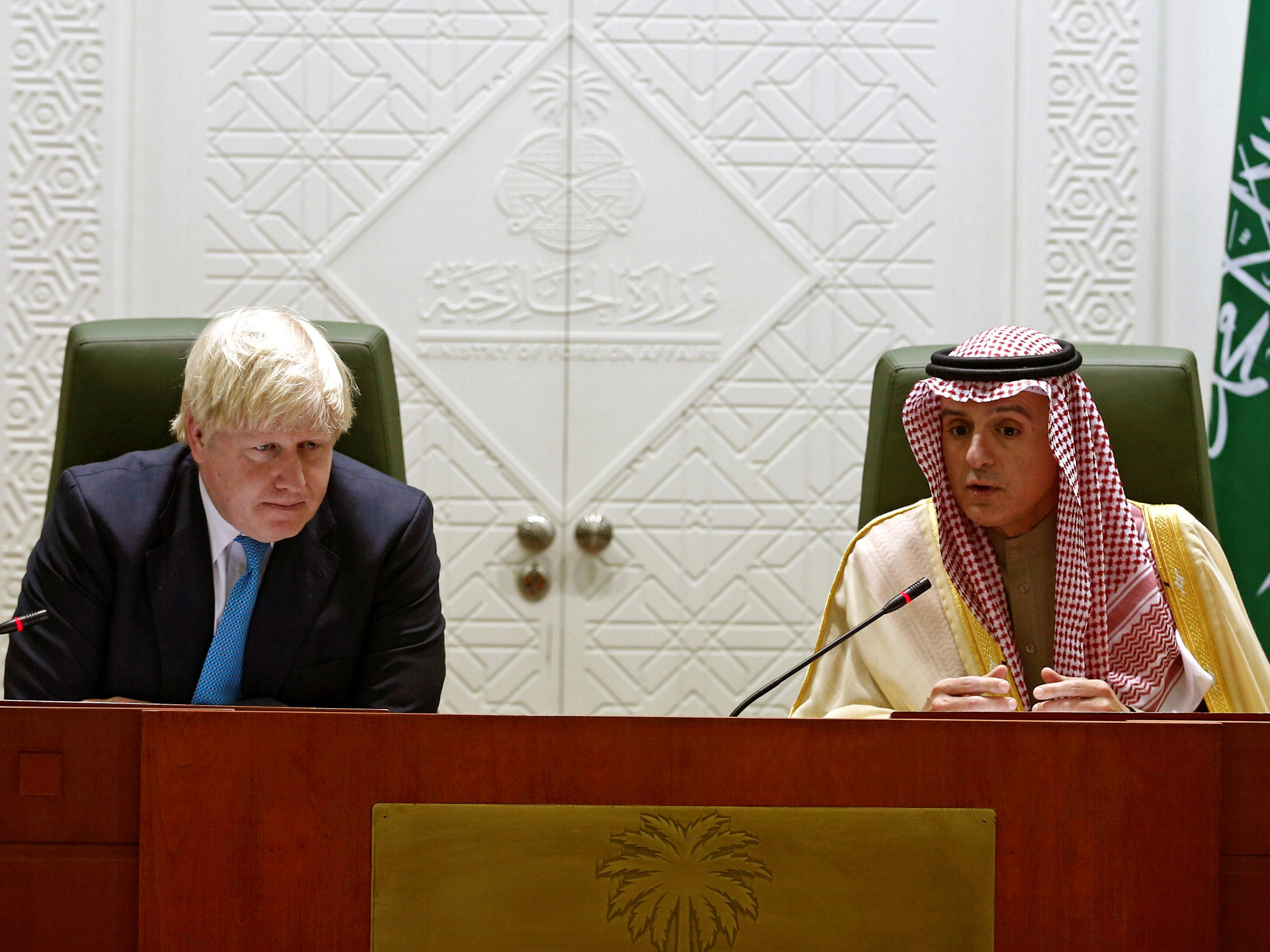
Boris Johnson has been urged to raise the case of a journalist jailed for insulting Islam with the Saudi Arabian government while the Foreign Secretary is visiting the country.
The call comes from Reporters Without Borders (Reporters Sans Frontières – RSF) on behalf of Raif Badawi, the co-founder of online discussion forum the Liberal Saudi Network.
In 2012 Badawi was found guilty of “insulting Islam through electronic channels” and “going beyond the realm of obedience” and sentenced to 10 years in prison and 1,000 lashes.
Johnson is currently in Saudi Arabia for diplomatic discussions.
In a letter to the cabinet, the organisation said: “We ask that you take the opportunity to raise Badawi’s case, the cases of other jailed journalists and citizen journalists, and the broader dire press freedom climate in the country, at the highest possible levels during your visit.”
Saudi Arabia is currently ranked 165 out of the 180 countries in RSF’s World Press Freedom Index.
The King of Saudi Arabia, Salman bin Abdelaziz Al Saud, is on the organisation’s list of “predators of press freedom”.
RSF said journalists in Saudi Arabia can face severe punishment for harming the king’s image and reputation, blasphemy and “inciting chaos”.
Criticism of the regime can lead to long jail sentences and flogging.
The group says the internet is the only space where independent news and information can be circulated, however online journalists are still watched closely.
RSF says at least eight other journalists and citizen journalists are currently jailed in the country.
Badawi won the 2014 RSF Press Freedom Prize in the citizen journalist category.
RSF’s full letter to Boris Johnson:
Dear Foreign Secretary,
I am writing on behalf of Reporters Without Borders (RSF) regarding your visit to Saudi Arabia. We have serious concerns about the press freedom situation in the country, in particular the case of jailed blogger Raif Badawi. We ask that you take the opportunity to raise Badawi’s case, the cases of other jailed journalists and citizen journalists, and the broader dire press freedom climate in the country, at the highest possible levels during your visit.
Saudi Arabia is currently ranked of 165th out of 180 countries in RSF’s World Press Freedom Index, and has consistently ranked among the world’s worst regimes for press freedom since the Index was established in 2002. The King of Saudi Arabia, Salman bin Abdelaziz Al Saud, has been on RSF’s list of ‘predators of press freedom’ since he succeeded his brother Abdullah as king in 2015. Salman has embodied the heritage of a dynasty that has always been hostile to media freedom.
At least 10 journalists and citizen journalists are currently jailed in Saudi Arabia. Harming the king’s image and reputation, blasphemy, insulting religion, and “inciting chaos” are all punished severely, often under the 2007 cyber crime law or the 2014 anti-terrorism law. The Internet is the only space where independent news and information can be circulated, but citizen journalists undertake serious risks when posting online. Like professional journalists, they are watched closely, and critical comments are liable to lead to arrest and unfair trials, ending in long jail sentences and sometimes accompanied by flogging.
Blogger Raif Badawi is one such case. Badawi is the co-founder of the Liberal Saudi Network, an online discussion forum, and winner of the 2014 RSF Press Freedom Prize in the citizen journalist category. The 33 year-old blogger has been jailed since 17 June 2012. The Saudi authorities say Badawi’s posts mocked the Committee for the Promotion of Virtue and the Prevention of Vice and questioned religion’s influence in Saudi society, thereby endangering public order. The site has been blocked since Badawi’s arrest.
In May 2014, Badawi was convicted of insulting Islam and sentenced to 10 years in prison, as well as 1,000 lashes and a 10-year ban on travelling abroad after the completion of his prison sentence, which was upheld by the supreme court in June 2015. Badawi’s flogging was widely condemned internationally, including by the UK Foreign Office, which has stated: “We are seriously concerned by Raif Badawi’s case. The UK condemns the use of cruel, inhuman or degrading punishment in all circumstances”. Badawi was awarded the Sakharov Prize by the European Parliament in 2015.
Badawi’s lawyer, human rights defender Waleed Abu Al Khair, has been jailed since 15 April 2014. He was sentenced to 15 years in prison on 6 July 2014 on charges of “preparing, storing and circulating content that undermines public order”, “inciting rebellion”, “publishing false information with the aim of harming the state”, contempt of court, and creating an NGO without state permission. A critic of prison conditions, Al Khair himself has now been subjected to mistreatment in detention, including physical violence and sleep deprivation.
Besides Badawi and Al Khair, at least eight other journalists and citizen journalists are currently jailed in Saudi Arabia. They include Zuhair Kutbi, a contributor to Makkah Online, held since 15 July 2015; Fawzan Al-Harbia citizen journalist held since 25 June 2014; Jassim Mekki A’al Safar, a photographer held since 18 June 2014;Alaa Brinji, a reporter for the Al-Sharq website, held since 13 May 2014; Fadhel Al-Manafes, a citizen journalist held since 17 April 2014; Wajdi Al-Ghazzawi, a presenter of Al-Fajr TV, held since 4 February 2014; Ali Jaseb Al-Touhifah a citizen journalist, held since 1 August 2012; and Jalal Mohamed Al-Jamal a blogger for the website Al-Awamia, held since 25 February 2012 .
We urge you to take the opportunity to raise these cases and the overall restrictive press freedom climate in Saudi Arabia at the highest levels of government and with the media during your visit. Thank you for your attention to these serious concerns.
Sincerely yours,
Christophe Deloire
Secretary General
Reporters Without Borders (RSF)
Email pged@pressgazette.co.uk to point out mistakes, provide story tips or send in a letter for publication on our "Letters Page" blog
